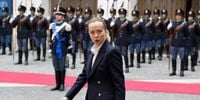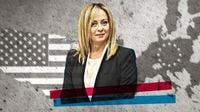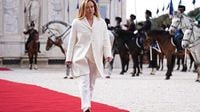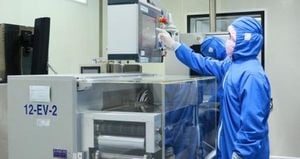On April 17, 2025, Italian Prime Minister Giorgia Meloni embarked on a challenging diplomatic mission to Washington, D.C., where she was set to meet with former President Donald Trump. The stakes were high, as the meeting aimed to address the contentious tariff policies that have strained transatlantic relations and impacted European markets.
The meeting, which Meloni announced on April 8, was viewed as a significant opportunity for both leaders. However, it came amid a backdrop of uncertainty, particularly after Trump publicly stated that he would only negotiate with the European Union (EU) as a whole and not with individual countries. This declaration raised questions about what Meloni could realistically achieve during her visit.
Upon her arrival, Meloni faced the dual challenge of advocating for Italy's interests while also representing the EU's collective stance. She was prepared to propose a zero-tariff agreement between the U.S. and the EU, a plan that had the backing of Ursula von der Leyen, President of the European Commission. Meloni emphasized the need for mutual commitment in negotiations, stating, "The negotiation must commit us all and at all levels, including us." This sentiment reflected her desire to foster a cooperative atmosphere between the U.S. and Europe.
Despite her diplomatic aspirations, the visit was fraught with potential pitfalls. Giovanbattista Fazzolari, one of Meloni's closest advisors, acknowledged the risks, describing the trip as "rich in pitfalls." The unpredictable nature of Trump added an additional layer of complexity, as his past interactions with world leaders have often been characterized by unexpected turns.
One of the main topics on the agenda was the tariffs imposed by the Trump administration, which have caused significant disruptions in international markets. Meloni's mission was to convince Trump to extend the temporary suspension of tariffs, which had been granted for at least 90 days, into a more permanent arrangement. She argued that such protective measures would ultimately harm both the U.S. and European economies, particularly in key sectors like automotive and agriculture.
In a meeting with Italian business leaders prior to her departure, Meloni expressed her concerns about the tariffs, labeling them as an "absolutely wrong decision" by the Trump administration. She highlighted the interconnectedness of Western economies, warning that aggressive protectionist policies could backfire and damage both sides.
Italy's trade balance with the U.S. is notably skewed in its favor, with a surplus of over $73 billion. This economic relationship has made Italy one of the most significant European players in trade with the U.S., with exports representing approximately 10% of Italy's total exports. Meloni planned to showcase strategic investments by Italian firms in the U.S., including projects by Eni, a major energy company, and Leonardo, a defense contractor.
In addition to tariffs, the ongoing conflict in Ukraine loomed large over Meloni's discussions with Trump. The Italian leader's support for Ukraine has been a cornerstone of her international policy since taking office, aligning her with both Biden and the EU. However, there are concerns that Trump may seek to distance himself from Western support for Ukraine, which could create friction between the two leaders.
As Meloni prepared for the meeting, she sought to maintain a delicate balance between firmness and diplomacy. She convened her top advisors, including Foreign Minister Antonio Tajani and Defense Minister Guido Crosetto, to strategize on how to navigate the complexities of the upcoming discussions. The consensus was clear: every word and gesture during the meeting could have significant repercussions.
In the lead-up to the meeting, Meloni remarked, "I don’t feel any pressure, as you can imagine," in a tone that suggested she was trying to manage expectations. Yet, her acknowledgment of the challenging circumstances illustrated the weight of the moment. The outcome of her discussions with Trump could define her credibility as a mediator between Europe and the U.S.
Moreover, the meeting was set against the backdrop of Meloni's recent criticism of European responses to global challenges, particularly regarding trade with China. She had expressed frustration over the EU's lack of a cohesive strategy, which she argued hindered timely action in the face of crises. This perspective aligns with her broader goal of strengthening Italy's position within Europe while also asserting its interests on the global stage.
As she prepared to engage with Trump, Meloni understood that her approach would be scrutinized not only by her domestic opposition but also by European allies. Critics within Italy have raised concerns about her ability to effectively represent Italy's interests without compromising European unity.
Upon her return to Rome, Meloni was scheduled to meet with U.S. Vice President J.D. Vance on April 18, further emphasizing the importance of her diplomatic efforts. This follow-up meeting was seen as an opportunity to reinforce the discussions held with Trump and to ensure that Italy's priorities remained front and center in ongoing negotiations.
Ultimately, Meloni's visit to Washington was more than just a meeting with a former president; it was a test of her diplomatic skills and a chance to solidify Italy's role as a key player in transatlantic relations. As she navigated the complexities of international diplomacy, her ability to adapt and respond to the unpredictable nature of her counterpart would be crucial in determining the success of her mission.









